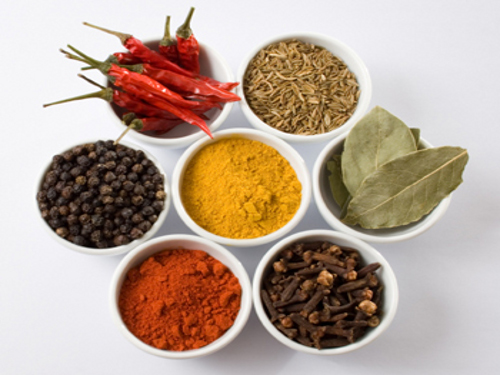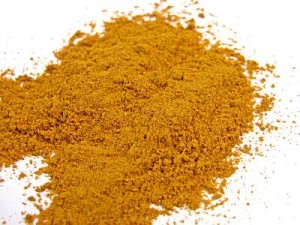 Many of us know about the great health benefits of garlic, ginger, and onions, but how many know about dried spices? In 2009, spices were added to the Mediterranean Diet Pyramid because of their amazing health benefits and disease fighting properties like antioxidants and other wonderful nutrients.
Many of us know about the great health benefits of garlic, ginger, and onions, but how many know about dried spices? In 2009, spices were added to the Mediterranean Diet Pyramid because of their amazing health benefits and disease fighting properties like antioxidants and other wonderful nutrients.
The ancient world used and lived by spices and now they have come back and research has proven why spices have been around for centuries. Many spices can replace supplements and offer you all the vitamins you need in their natural form. When foods are in their natural form, your body absorbs the nutrients more efficiently than a pill.
They have also been shown to aid in weight loss and reducing belly fat. And if that was not enough they make foods delicious and exotic!
Why Spices?
Spices are great source of natural antioxidants. These natural plant sources protect our cells from free radical damage and help prevent chronic diseases like cancer and heart disease.
Spices are nutrient dense because these natural sources of antioxidants become concentrated once the water is removed. All you need is a little to gain many health benefits. Spices are even more beneficial because they are low in calorie and have little to no fat, which keeps your waistline trim.
Other nutritious advantages of spices are an increase in energy, a healthier immune system, and an increase in thermogenic energy, which is linked to weight loss. It is not surprising that spices have been around for centuries and used for medicinal purposes. Not only are they a great addition to fresh foods but they can also help spice up prepared foods.
The Difference Between Herbs and Spices
Herbs and spices are often used together and thought of as being the same. Some plants produce both an herb and a spice. For example, cilantro and coriander come from the same plant even though they taste quite different.
Spices come from bark, buds, roots, seeds, and berries. Also they come from the fruit of different trees and plants. Common spices in the US are cinnamon, cloves, ginger, cumin, black peppercorns, and paprika.
Herbs, on the other hand, come from the leaf of a plant. Herbs we are used to seeing are basil, oregano, rosemary, thyme, parsley, sage, and chives. Dried herbs and spices should be replaced every 6 months and should be stored in a dry and cool place. That drawer by your stove isn’t ideal (although it is convenient) because heat destroys some of the antioxidants.
Have Fun with Spices
 Combining spices increases the health impact, as each has its own benefit. The next time you go to make dinner, be creative! Combining different spices will give dishes new and exciting flavors, and the possibilities are endless. Here are some spices to choose from along with their health benefits:
Combining spices increases the health impact, as each has its own benefit. The next time you go to make dinner, be creative! Combining different spices will give dishes new and exciting flavors, and the possibilities are endless. Here are some spices to choose from along with their health benefits:
- Curry Powder – Curry powder is a mixture of several spices and contains curcumin, which is also found in tumeric. This ingredient has been shown to reduce the risk of developing diabetes and lower the risk of heart failure. On top of that it has been shown to stop the growth of cancer cells! That is one powerful spice; try adding it to soups, stirfrys, and on top of nuts and popcorn!
- Cinnamon – Diabetes Care published a study stating that cinnamon has been shown to help improve glucose levels and LDL cholesterol levels in people with type 2 diabetes. It can help you lose weight in the abdominal area, as it is most sensitive to high sugar levels. Stir it into oatmeal, or use on toast, baked breads, and even into macaroni and cheese.
- Paprika – Paprika has been shown to decrease appetite and lower blood pressure. It also can boost your metabolism. This great spice can be sprinkled on chicken and steaks, as well as on top of eggs and potatoes.
- Cardamom – This spice is what gives chai tea its distinct flavor. Cardamom has been known for centuries to help increase circulation and improve one’s energy. Other health benefits are that it assists in proper digestion and absorption of nutrients, as well as improves asthma and bronchitis. Add this great spice to curries, breads, marinades, and Mediterranean foods.
- Star Anise – People have chewed the seeds of this star shaped fruit for centuries to help with digestion after meals. It also helps with rheumatism and improves your immune system. The flavor is similar to black licorice and is delicious in stews, meat dishes, and soups. It is very common in Indian cuisine.
- Cayenne – This spice contains capsaicin, which is also found in crushed red pepper flakes and paprika. It has been found to boost metabolism after being eaten. Also, when added to foods it can help people from being tempted to overeat as it contributes to feelings of fullness. This spice is great for rubs, on pizza, and in stirfrys.
- Turmeric – This bright yellow spice is an anti-inflammatory agent, as well as a great antioxidant. Recently, Harvard researchers found that adding turmeric into meals frequently can lower rate of breast, prostate, lung, and colon cancer! Add it to fish and sausage for a deep mustard-like taste. But be careful, the taste develops during cooking, so add slowly.
Spicing Up Your Diet
Spices are great compliments for meats, fish, chicken, vegetables, and desserts. With all the amazing health benefits why not try a few? The more you understand the flavors of these spices, the more you will appreciate them and learn what goes well together.
Some medications can react to certain spices; so if you are taking any medication make sure to double-check with a health care professional before changing your eating habits. Winter is a great time to try new spices because it can be hard to find fresh ingredients. Mix these spices and herbs into stews and soups for flavor and amazing health benefits.
The choices might seem overwhelming, but remember you don’t need to try them all out at once. Start with one and build from there. All it takes is a little sprinkle and you will be on your way to achieving a healthier lifestyle!